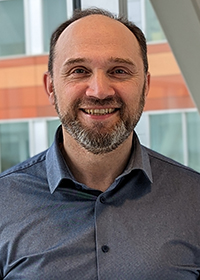Breadcrumb
- Home /
- Research /
- Programs /
- Infectious Diseases and Immunity in Global Health /
- Leadership and Management

IDIGH | Infectious Diseases and Immunity in Global Health Program
IDIGH
RESEARCH PROGRAMS
Leadership and Management
The Management Committee of the Infectious Diseases and Immunity in Global Health Program (IDIGH) consists of representatives from all three pillars of the program (fundamental, epidemiology and health outcomes, and clinical research), as well as members from outside the program and research trainees. The committee meets three or four times a year to address issues and discuss strategies and action points that move the IDIGH program toward its objective of becoming a leading centre for translational research in infectious and immune-mediated diseases of global importance.
 |
Management representatives
Ciriaco Piccirillo, PhD (Program Co-leader)
Alexandra De Pokomandy, MD, M.Sc. (Program Co-leader)
Éric Béliveau, PhD (Program Manager)
Representatives of fundamental research
Nicole Bernard, PhD
Representatives of epidemiology and health outcomes research
Theresa Gyorkos, PhD
Marina Klein, MD
Madhukar Pai, MD
Representatives of clinical research
Don Sheppard, MD
Marcel Behr, MD
Representatives of graduate students and postdoctoral fellows
Lauren Nagel (co-chair of the IDIGH trainee committee)
Tho-Alfakar Al-Aubodah (co-chair of the IDIGH trainee committee)
External (non-IDIGH program) member
Maziar Divangahi, PhD
| Program leaders and manager | ||
Prof. Piccirillo leads an internationally recognized research program that focuses on the immune regulation of autoimmune, infectious and inflammatory diseases. His research attempts to harness the power of the immune system to boost, stop or restore T cell function, particularly Foxp3+ regulatory T cells, in autoimmune and inflammatory diseases, cancers or immunodeficiencies. His research is responsible for many seminal and pioneering studies in pre-clinical animal models, non-human primates and humans. His current research program makes use of mouse models and human disease systems to monitor and characterize the development and functional dynamics of T cell function in health and disease and in therapeutic settings. His research also focuses on the development of novel immunotherapeutic strategies to monitor and manipulate Foxp3+ regulatory T cell function and ultimately modulate immune responses in infectious, autoimmune and inflammatory disorders. | ||


